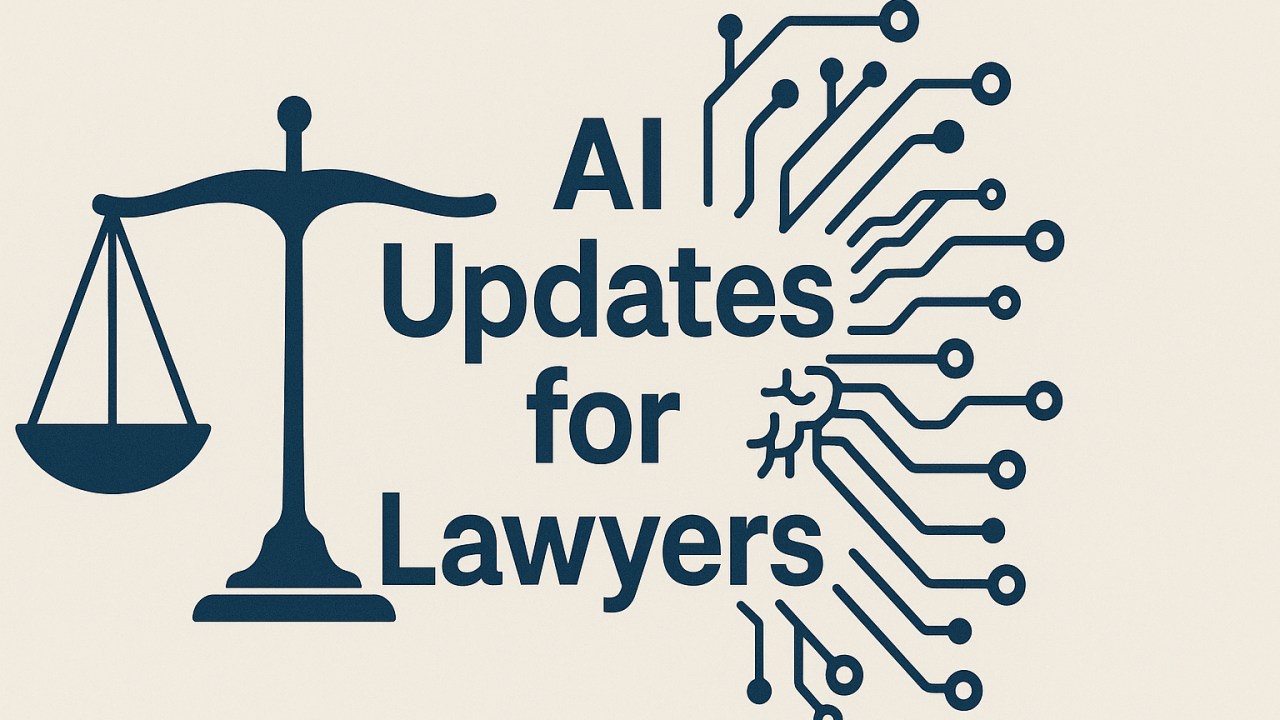Google DeepMind's AlphaEvolve Achieves AI Breakthroughs; Legal AI Training Evolves
Google DeepMind’s AlphaEvolve Achieves AI Breakthroughs; Legal AI Training Evolves
Executive Summary: This week, Google DeepMind announced AlphaEvolve, an AI agent that has made significant algorithmic discoveries, demonstrating AI’s capacity for novel invention. Concurrently, legal education is adapting by integrating AI literacy into curricula, exemplified by UC Berkeley’s new program.
- Google DeepMind’s AlphaEvolve Demonstrates Novel AI Invention. For years, the absence of novel inventions was held up as proof that large-language models (LLMs) were merely statistical parrots [1, 2]. Google DeepMind announced this week that they cleared that milestone with AlphaEvolve, a Gemini-powered evolutionary coding agent. After fifteen months of internal testing, AlphaEvolve (i) discovered a 4 × 4 matrix-multiplication algorithm requiring only 48 scalar multiplications, besting Strassen’s 1969 record of 49; (ii) rewrote part of Gemini’s training kernel for a 23 percent speed-up, trimming overall training time by about 1 percent; and (iii) devised a data-center scheduling heuristic that recovers roughly 0.7 percent of Google’s global compute capacity [3, 4]. Each result was either formally proved or benchmarked in production before publication.
Why It Matters for Lawyers: For lawyers the takeaway is reassuring. AI can outstrip humans when problems have objective scoring functions, like runtime or resource use, but law remains an interpretive discipline. Breakthroughs like AlphaEvolve foreshadow augmented legal workflows: AI shoulders computational heavy lifting, while attorneys retain strategic control, supplying the judgment to turn AI-generated analyses into enforceable documents.
- Legal Education Adapts with AI Literacy and Hands-on Training. Earlier this spring, UC Berkeley unveiled a dedicated curriculum on responsible legal AI. This announcement crystallizes a broader shift in how young lawyers are trained: law schools are embedding AI literacy into law school courses. Firms such as K&L Gates give summer associates hands-on experience with tools like Casetext’s Co-Counsel. The goal is to ensure that automation accelerates research and document review without displacing critical human judgment, strategic insight, and ethical guardrails [5, 6].
Why It Matters for Lawyers: The integration of AI training into legal education and firm practice signals a move towards AI-augmented legal workflows. Young lawyers will increasingly be expected to leverage AI tools effectively while maintaining ethical standards and providing critical oversight, ensuring technology serves as an accelerant rather than a replacement for legal expertise.
- OpenAI’s HealthBench Study on AI in Medicine. OpenAI’s HealthBench studies suggest frontier models like GPT-4.1 and “o3” score higher on medical Q&A rubrics than physicians alone or physicians editing model drafts, leading some to claim human input is a drag on performance [7, 8, 9]. However, close review of the experimental setup suggests this “AI-alone-is-best” conclusion may be premature. In the study, the physicians using AI were only allowed to edit opaque, one-pass drafts in a constrained interface, and they may have struggled with trust calibration if they were unfamiliar with the AI tools and interfaces tested[10].
Why It Matters for Lawyers: Fields like corporate and contract law still benefit from lawyers in the loop who supply client-specific context, verify citations, assume ethical accountability, and feed corrections back to the model, which are advantages benchmarks rarely capture [11, 12]. Well-designed workflows that surface model uncertainty and harness legal expertise can provide a hybrid system that is faster and more trustworthy. Keeping lawyers firmly in the loop remains the safest path to harnessing AI’s power.
Conflicts of Interest. The author practiced law for six years at Ropes & Gray LLP prior to co-founding UseJunior. UseJunior is a member of both Google for Startups and Microsoft for Startups and has received grants and in-kind contributions in connection with these programs. The views expressed herein are our own and do not represent the views of Google, Microsoft or Ropes & Gray LLP. This is not legal advice.
References
- See, e.g., Dwarkesh Patel, @dwarkesh_sp, X (Mar. 18, 2025, 9:11 PM), https://x.com/dwarkesh_sp/status/1896412699753660770. However, others, like Logan Kilpatrick of Google, had observed that discoveries with LLMs are possible but users need to “prompt them out” of the LLMs. @OfficialLoganK, X (Feb. 9, 2025, 8:17 AM), https://x.com/OfficialLoganK/status/1888724964200546501.
- Google DeepMind, AlphaEvolve: A Gemini-Powered Coding Agent for Designing Advanced Algorithms (May 14, 2025), https://deepmind.google/discover/blog/alphaevolve-a-gemini-powered-coding-agent-for-designing-advanced-algorithms/.
- Sasha V. Novikov, @SashaVNovikov, X (May 14, 2025), https://x.com/SashaVNovikov/status/1922670227763904805.
- Machine Learning Street Talk, @MLStreetTalk, X (May 14, 2025), https://x.com/MLStreetTalk/status/1922702189341864042.
- LexisNexis, AI Is Preparing the Next Generation of Lawyers (Apr. 15, 2024), https://www.lexisnexis.com/html/ai-is-preparing-the-next-generation-of-lawyers/.
- Pro Bono Inst., The Power of Training: Educating Lawyers on AI Tools to Scale Pro Bono Efforts (Aug. 28, 2024), https://www.probonoinst.org/2024/08/28/the-power-of-training-the-importance-of-educating-lawyers-on-ai-tools-to-successfully-scale-pro-bono-efforts/.
- OpenAI, Introducing HealthBench, OpenAI Blog (May 12, 2025), https://openai.com/blog/healthbench.
- David Borish, HealthBench: OpenAI’s New Benchmark Shows AI Models Outperforming Physicians in Some Tasks, LinkedIn (2025), https://www.linkedin.com/pulse/healthbench-openais-new-benchmark-shows-ai-models-some-david-borish-seqqc/.
- OpenAI et al., Evaluating Large Language Models Toward Improved Human Health, arXiv:2505.08775 (2025), https://arxiv.org/abs/2505.08775.
- Fragiadakis et al., Evaluating Human-AI Collaboration: A Review and Methodological Framework, arXiv:2407.19098 (2023), https://arxiv.org/abs/2407.19098.
- OpenAI et al., supra (citing their arXiv paper again for the general point about benchmarks not capturing all advantages of human involvement).
- Okamura & Yamada, Adaptive Trust Calibration for Human–AI Collaboration, PLOS ONE 15:e0231745 (2020), https://journals.plos.org/plosone/article?id=10.1371/journal.pone.0229132.
About Steven Obiajulu

Steven Obiajulu
Steven Obiajulu is a former Ropes & Gray attorney with deep expertise in law and technology. Harvard Law '18 and MIT '13 graduate combining technical engineering background with legal practice to build accessible AI solutions for transactional lawyers.
